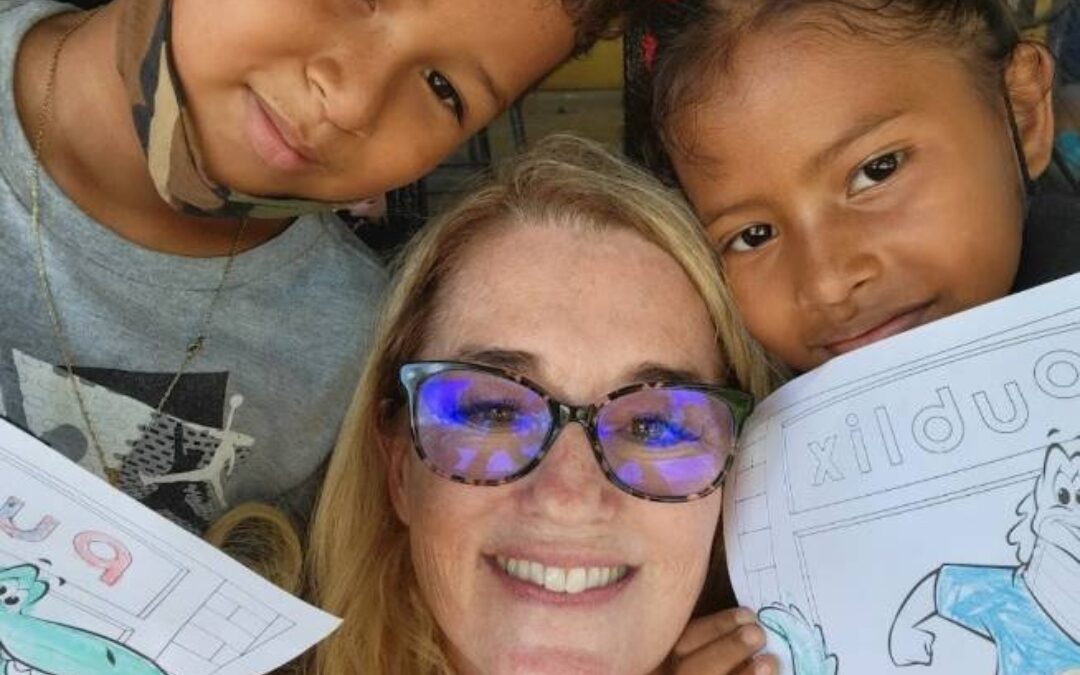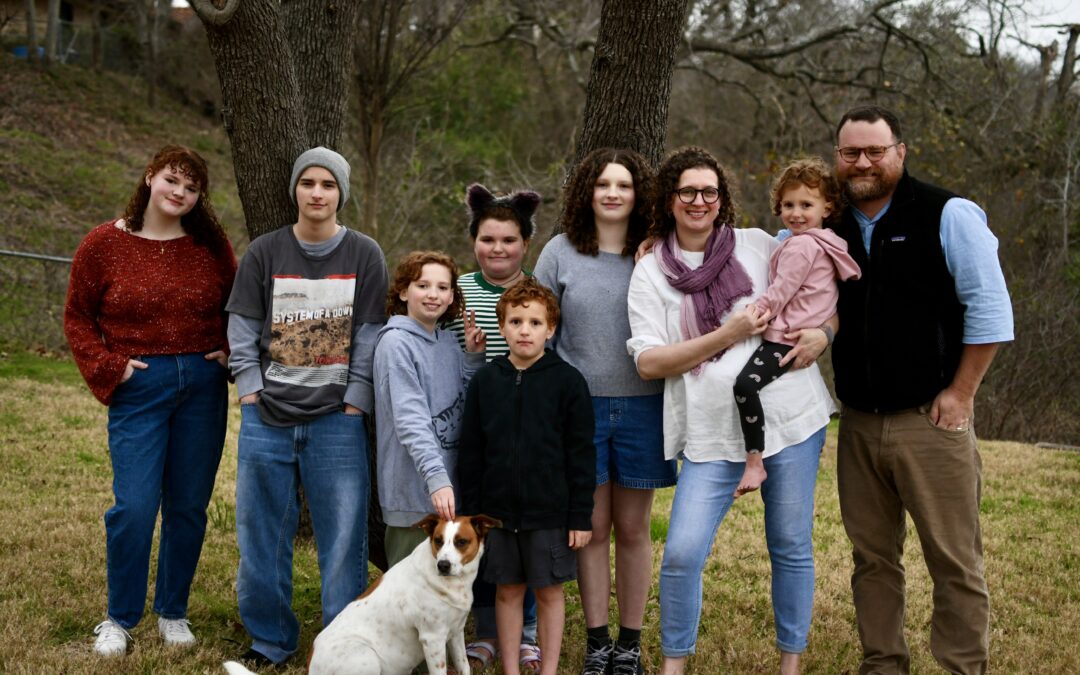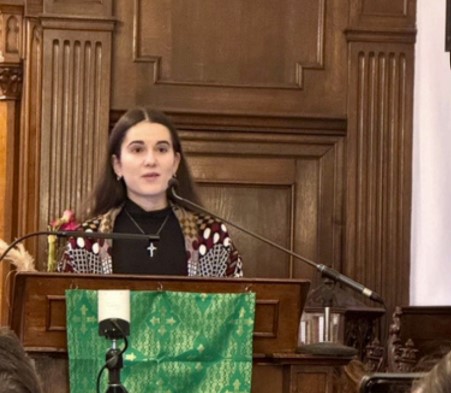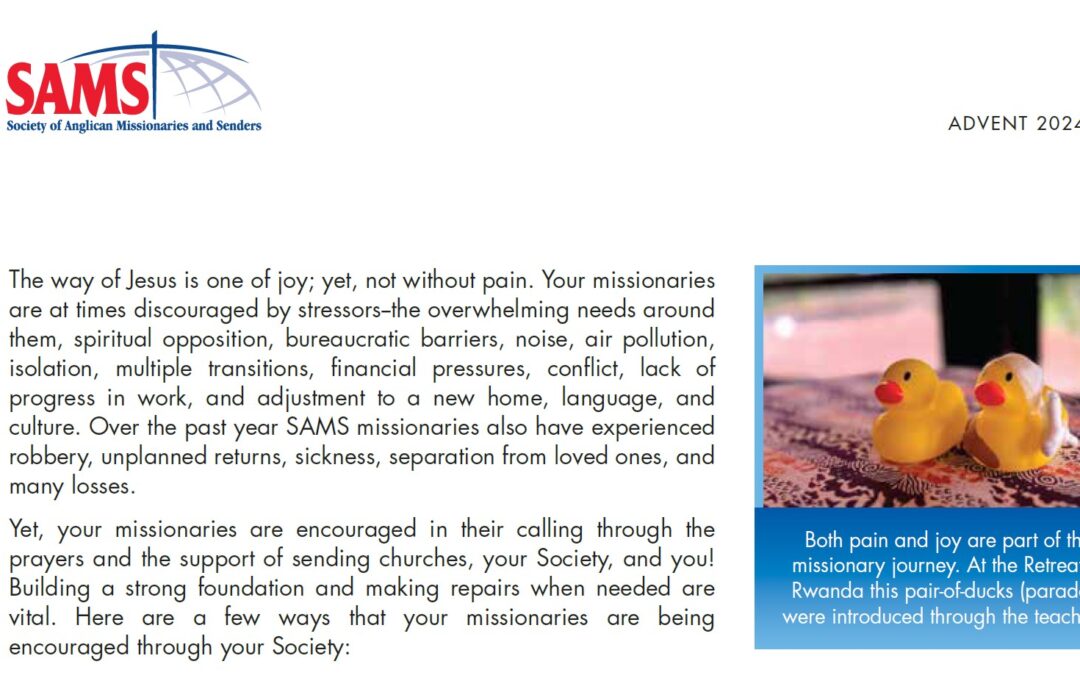
by Brendan Kimbrough | Feb 28, 2025 | Refugee Ministry, SAMS Missionaries, Uganda
It’s a dusty, jaw-rattling, two-hour drive over rough Ugandan roads to get to the Kiryandongo Refugee Camp in northern Uganda. SAMS Missionary Cathy Clevenger and her team make the drive once or twice a month to minister to groups of refugees living there, but wisely, not during the weekly food distribution. The camp is a city in its own right. A sprawling sea of homes spread out for miles, which include schools, churches, make-shift shops, U.N. health clinics, and the requisite food distribution points. It’s comprised of nearly 100,000 people, who represent just a portion of the fallout in terms of the real human cost caused by the carnage of civil war and continuing tribal conflict in South Sudan and Sudan.
One of the stark realities, besides the sheer size of the humanitarian dilemma here, is the excruciating trauma. “The majority of the population in the camp is women and children” says Cathy. “Most of the Sudanese men have either been killed or remained behind in their tribal areas to fight. The stories are real, yet always heartbreaking. So much violence, displacement, killing, and loss of loved ones has taken place.”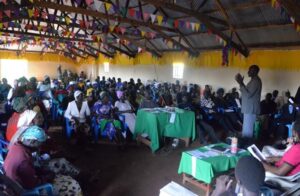
It could be overwhelming to confront such a human tragedy, but Cathy’s well-trained team faces it head-on in the hope and the power of the Gospel. Cathy draws on decades of experience treating trauma as a licensed social worker in the U.S. before the Lord called her to East Africa. In her current role as Counseling Coordinator for the Diocese of Masindi-Kitara, Cathy had been treating Ugandan teenagers at a local remand home for incarcerated young boys awaiting court dates. Cathy still carries out that important work, while ministering to the burgeoning refugee population and their dilemma that God had placed in front of her in late 2023.
With the scale of suffering that exists at the Kiryandongo Camp, one question arises: How can this many people possibly be treated who have experienced such terrible things? Much of the answer lies in the power of the Gospel, not only to open up people to understand their own response to trauma and begin to heal, but then to also trust that those same people will take what they’ve learned to others. It’s a replicative model of treatment that by God’s grace makes use of Scripture, small groups and guided teaching.
 Cathy and her team typically speak to an assembled group from churches within the camp about trauma and teach them what trauma looks like, what the responses to it typically are, and why people respond the way they do. They use the story of Elijah and the dramatic showdown on Mount Carmel where Elijah successfully demonstrates the power of God over Baal, which prompts Queen Jezebel to threaten to kill him, creating intense fear and a desperate flight for his life (one of the four main responses to trauma). God intervenes with the appearance of an angel who provides for him. Elijah reaches Horeb where he encounters the still small voice of God which reassures him of his purpose and gives him new instructions.
Cathy and her team typically speak to an assembled group from churches within the camp about trauma and teach them what trauma looks like, what the responses to it typically are, and why people respond the way they do. They use the story of Elijah and the dramatic showdown on Mount Carmel where Elijah successfully demonstrates the power of God over Baal, which prompts Queen Jezebel to threaten to kill him, creating intense fear and a desperate flight for his life (one of the four main responses to trauma). God intervenes with the appearance of an angel who provides for him. Elijah reaches Horeb where he encounters the still small voice of God which reassures him of his purpose and gives him new instructions.
Not only does the story reveal the vulnerability of God’s own prophet, but it shows the reality of living as a Christian; that strong belief can be severely tested by acute suffering, and that turning to God for renewal again and again is vital, especially in times of crisis. The teaching is designed to show camp participants how they can also use this teaching with others within the camp. This ‘teaching plus training’ approach is designed so that the refugees can use it within their own churches inside the camp as they recognize those who have symptoms of trauma. After the group teaching, small group work is done where one-on-one therapy is held.
Cathy says, “We offer hope and we see real deliverance from the loss of it. We don’t have food, or clothes, or other assistance to give them. We offer something far better. We offer them Jesus, his healing, and his transforming love. The Gospel promise of real and lasting restoration through healing is at work here among a people who have lost everything.”

by Brendan Kimbrough | Feb 28, 2025 | Short-term Missions

Jennifer Ruben is a Jesus-follower and an Anglican committed to help other Anglicans engage in mission. As the founder of One 8 Go Global, her main aim is to summon others to take the Gospel to all nations. Her ministry takes its name from Acts 1:8, “But you shall receive power when the Holy Spirit has come upon you; and you shall be witnesses to Me in Jerusalem, and in all Judea and Samaria, and to the end of the earth.”
Throughout its history, SAMS has invited churches to enhance their global outreach through short-term missions that contribute to the long-term ministry of missionaries and the global Anglican church. SAMS is now promoting one more way for both churches and individuals to participate in a short-term mission by commending One 8 Go Global. This option will provide teams and individuals with a complete package, starting with preparation and concluding
with debriefing!
Leading short-term missions takes experience, training, logistical and spiritual support on the field, and global partners. Jennifer has fostered relationships in Latin America, Africa, Asia, Europe, and the USA with several different denominations. In 2025, One 8 Go Global is planning
six missions. Jennifer will completely prepare the team, accompany the team, and debrief the team. She is currently working to fill-out the Malawi team in July, who will conduct village evangelism, discipleship, food relief, and a children’s program. Email Nita at info@sams-usa.org to connect directly with One 8 Go Global.


by Brendan Kimbrough | Feb 21, 2025 | Europe, SAMS Missionaries
New SAMS Missionary Candidates Lee and Ela Nelson are responding to a call to contribute to the re-evangelization of Europe through the Knüll Camp and Conference Center in Schwarzenborn, Germany. Two ACNA jurisdictions will come alongside Lee and Ela and their children for a collaborative sending effort. Both the Reformed Episcopal Church (REC) Board of Foreign Missions and the Diocese of the Fort Worth are engaged in directly supporting and encouraging others to join this ministry as Senders of the Nelson family.
For five decades REC Bishop Gerhard Meyer with his wife Grace led the Camp, where many have been blessed in the Lord. As the new director, Lee will be developing a training center to encourage the planting of healthy, multiplying churches throughout Europe.
While work needs to be done to upgrade the camp, Lee and Ela envision it as a strategic place to launch initiatives like the training center. A second focus will be to make the camp a hospitable refuge for beleaguered Christians, lay and clergy alike. Please pray for the Nelson family as they seek Senders and then transition
from Texas to Germany to equip and refresh the church.
Visit the Nelson’s page

by Brendan Kimbrough | Jan 17, 2025 | Netherlands, Netherlands
We see the Light of the World…
… in Christ’s work all around us. Here in Amsterdam at this time of year beautiful lights are on display all over the city reflected in the many canals and creatively adorning the historic buildings. But we live in a tumultuous time and sometimes the lights might give the impression that all is well, but darkness is all around.
Ukrainian refugees continue their sojourn here and war is near. No Amsterdammer can forget that thousands of Jewish residents were sent away to perish in the Holocaust. The streets glittering with Christmas lights also display small brass commemorative plates on the pavement in front of homes where Jewish families once lived. Hatred of Jewish people cropped up recently. Rioting hooligans after a football (soccer) match remind us that human sinfulness remains. One of the leading Rabbis in Amsterdam recently stated that both Jewish and Muslim communities presently feel themselves scorned and unwanted, for it is all too easy to blame the nearest immigrant or person who is “not like us.” The darkness lingers.

As a church in the heart of the city we continue to meet curious neighbors and visitors who are interested in things spiritual or something they just cannot quantify. Is it the light of Christ they see? Often they are surprised by our diversity with so many nationalities, ages, economic backgrounds and professions. We trust that it has to do with the music of Messiah reverberating from the lives of our people and the warm hospitality driven by love, leaving an unforgettable impact as the light of Christ shines through. Here are a few recent examples.
- “Ned,” a 74 year-old, got the difficult news of terminal lung cancer. Though he lived only 3 more weeks, he was amazed and comforted as God’s people rallied around. He said, “I’ve never had so many people around me in all my life!”
- Life-long church member, “Phylis,” is 95 and lives alone in an assisted living home. She looks forward to singing Christmas carols and offering hospitality to our pastoral team when they visit. Her trust in the Lord in old age is such an encouragement to many.
- “Alice” is a 16 year-old who recently began attending youth group with a friend. She eagerly participated in our recent carol service as a reader.
- Jono, another teen, saw the light of Christ in the lives of both of his grandmothers. Through their prayers and encouragement, he began faithfully attending our services.
- “R” has experienced life on the street for the past two decades due to issues of mental illness. It is gratifying that our people welcome him to our services. Just this week he attended a midweek communion service on a blustery day. He was in tears as we took bread and cup together in anticipation of that day when we will reside in that city “where the Lamb is the light.”
“The light shines in the darkness, and the darkness has not overcome it.” John 1.5

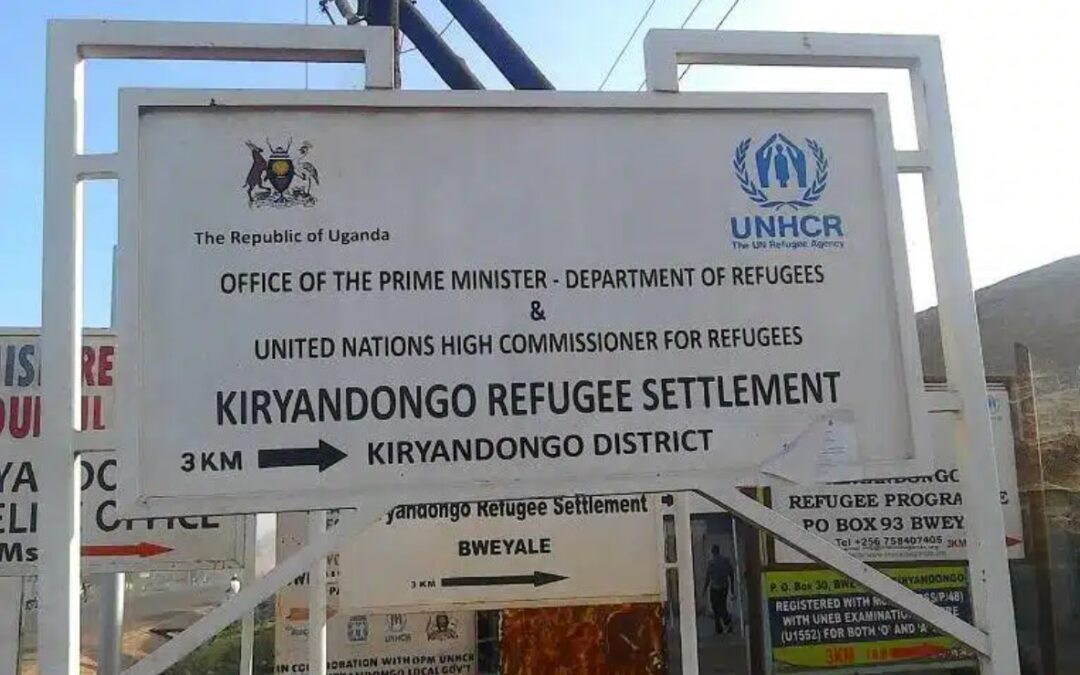

 Cathy and her team typically speak to an assembled group from churches within the camp about trauma and teach them what trauma looks like, what the responses to it typically are, and why people respond the way they do. They use the story of Elijah and the dramatic showdown on Mount Carmel where Elijah successfully demonstrates the power of God over Baal, which prompts Queen Jezebel to threaten to kill him, creating intense fear and a desperate flight for his life (one of the four main responses to trauma). God intervenes with the appearance of an angel who provides for him. Elijah reaches Horeb where he encounters the still small voice of God which reassures him of his purpose and gives him new instructions.
Cathy and her team typically speak to an assembled group from churches within the camp about trauma and teach them what trauma looks like, what the responses to it typically are, and why people respond the way they do. They use the story of Elijah and the dramatic showdown on Mount Carmel where Elijah successfully demonstrates the power of God over Baal, which prompts Queen Jezebel to threaten to kill him, creating intense fear and a desperate flight for his life (one of the four main responses to trauma). God intervenes with the appearance of an angel who provides for him. Elijah reaches Horeb where he encounters the still small voice of God which reassures him of his purpose and gives him new instructions.
